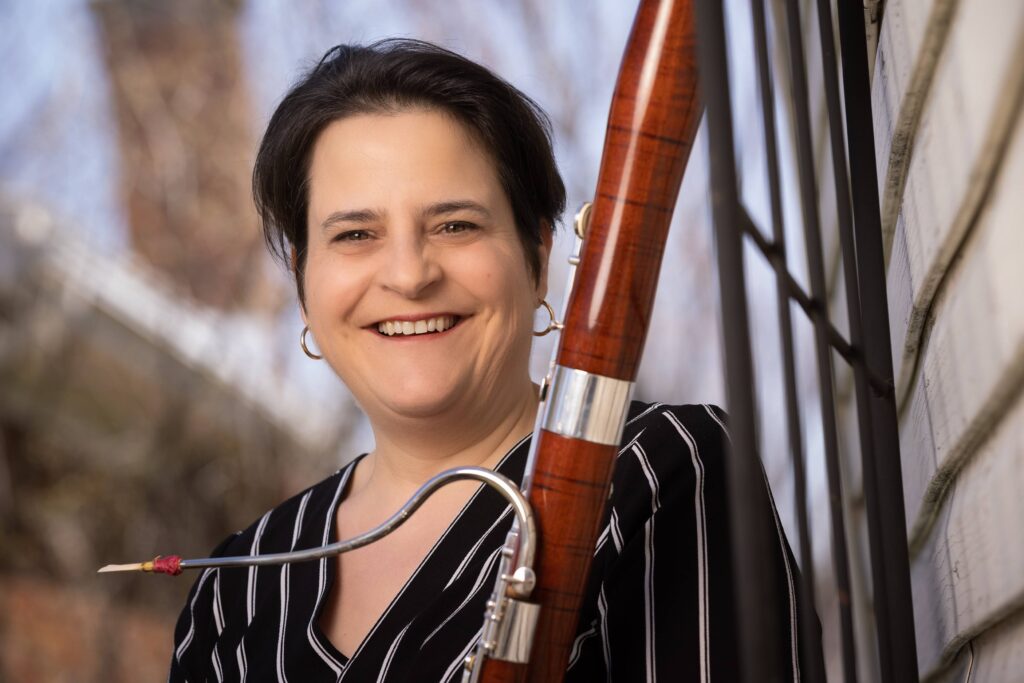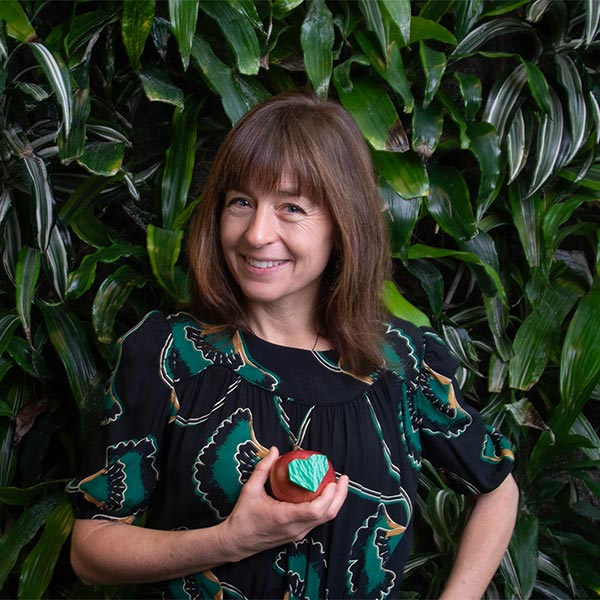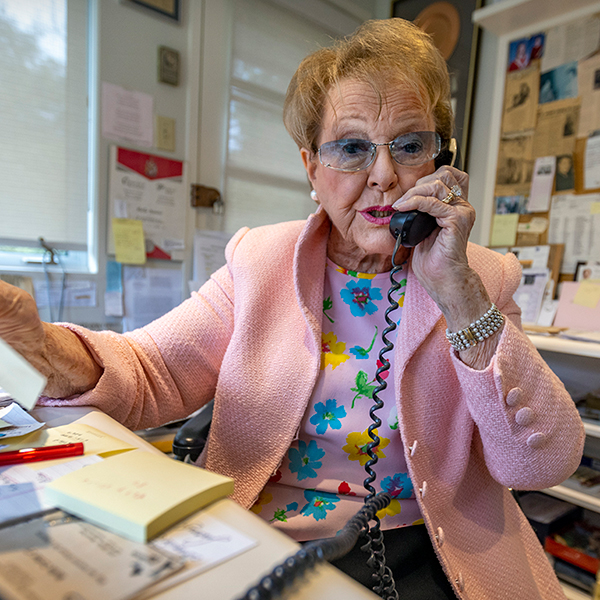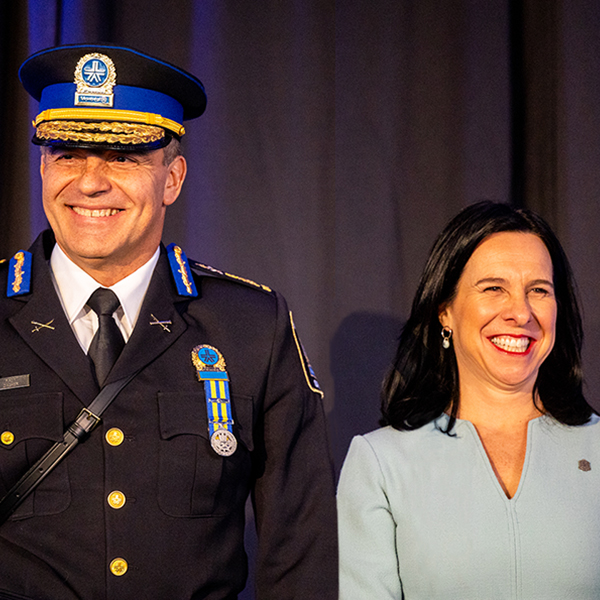As a member of both the Orchestre symphonique de Laval and the Orchestre symphonique de Trois-Rivières, Françoise Henri, MMus’98, performs regularly for audiences that are accustomed to enjoying classical music concerts. Much of her time, though, is focused on how to share the pleasures of music with those who don’t have such easy access to it.
Henri is the general and artistic director of the Société pour les arts en milieux de santé. Better known as La SAMS, the organization was launched in 2009 with the goal of bringing music to hospital patients and long-term care residents throughout Quebec. Since then, it has organized more than 8,000 concerts in 650 institutions. Henri took on her current role with La SAMS in 2014.
For years, La SAMS has been organizing concerts in nursing homes and other health care facilities, hoping to spark joy in patients struggling with illness and advanced age. Then the pandemic changed everything.
“We stopped our live performances,” says Henri. They switched to livestreaming their music, and relying on solo performances as the group’s musicians settled into self-isolation. But there was a problem: many public nursing homes did not have access to the internet. “It’s amazing how society moved on, technologically, but these homes did not,” says Henri.

She and her team decided they couldn’t stand idly by, so they found a way to bring their music inside even the most isolated homes. “The most advanced technology they had at the time was DVDs,” she recalls. “So we actually made a DVD and mailed it to them.”
Trained as a bassoon player, Henri has made it her mission to fill the lives of vulnerable people with music, and the pandemic isn’t slowing her down. “It’s a very powerful feeling, music,” she says, recalling the first time she began playing an instrument as a child. “I remember learning the recorder in school when I was six or seven.” It’s not the most evocative instrument — nor one of the most sonorous — but Henri enjoyed the act of repeating musical phrases. “When you’re a small kid, you’re surrounded by so many triggers, but this was something that was peaceful,” she says. “Eventually, I got tired of repeating phrases on the recorder and wanted to make it even more beautiful – more complicated. It kept me going.”
Henri began playing the flute and focused on it in CEGEP, but soon realized she couldn’t play fast enough to make a career out of it. When she started a bachelor’s degree in musical performance at the Université de Montréal in 1989, she switched to the bassoon. “The bassoon is either the clown of the orchestra, or it’s used for very languorous, sad melodies,” she says. “But I learned it very quickly and fell in love with the sound and the repertoire. It’s a very warm, very earthy sound, like a speaking voice, a tenor or a baritone, very nice and mellow.”
Many composers treat the bassoon as an afterthought. “Sometimes you can feel a little bit left out,” says Henri. But she fell in love with the works of Igor Stravinsky, who she describes as “maybe the first composer to push the bassoon out of its comfort zone.” His ballet The Rite of Spring opens with a bassoon solo that was considered particularly audacious when it debuted in 1913. “It feels extravagant,” says Henri.
Her enthusiasm and skill pushed her to continue her studies with an advanced diploma at the ArtEZ Academy of Music in the Netherlands, followed by a master’s degree in music at McGill. “I remember doing a whole semester on rhythm and thought it was so amazing to take the time to reflect on these things,” she says.
In 2000, two years after graduating from McGill, Henri and her friend Daniel Myssyk, a contrabassist and conductor, founded Appassionata, a chamber orchestra dedicated to the democratization of classical music. They began staging performances and creating special compositions for students in Montreal’s underprivileged neighbourhoods. “It was really revealing to me,” says Henri. “I felt this was the reason I studied all those years. I always felt that playing concerts in the hall is very nice, very good, but maybe a little – not sterile, but a little closed. If you can have more impact in your community it’s even better.”
That was the feeling that eventually led her to La SAMS. “When I saw the opening, I thought, this is the work I’m supposed to do,” she says.
What struck Henri most was how invigorating the performances were for their audience. “Music reaches a part of the brain that is extremely powerful in terms of memory,” she says. “We usually ask the performers to play some melody that the audience already knows. This helps them escape their actual medical condition, to go back to a time when they were healthier, with their families.”
That revelation inspired Henri to launch an initiative called Cueilleurs de mémoires — Memory Gatherers — that saw La SAMS team members interview care home patients about their lives. Composer Kiya Tabassian then used the material to create a new composition, while songwriter Hélène Dorion used the elders’ words to create lyrics that were sung by soprano Suzie LeBlanc. “It turned out to be a very atmospheric piece,” says Henri.
Covid-19 made such efforts impossible, but La SAMS was able to adapt. It launched a streaming service called LaSAMS.tv with musical performance on demand, and it began broadcasting a live 45-minute concert every Tuesday, Wednesday and Thursday. Most nursing homes now have internet access, one of a number of improvements made in response to the pandemic.
This summer, La SAMS will begin a series of outdoor concerts, and it has even begun playing in-person at some homes, but “digital activities are here to stay,” says Henri. “Even if it’s not an in-person concert, it still feels good.”


